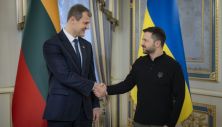The defense ministers of Romania, Poland, and Latvia have signed a joint letter to NATO allies, emphasizing the urgent need for implementing a NATO air defense rotation model and strengthening NATO’s activities in deterrence, surveillance, intelligence, and air patrols on the alliance’s eastern flank.
Delfi reported that, Latvian Defense Minister Andris Sprudens called for collective solutions to enhance NATO’s airspace security during the Bucharest Nine defense ministers’ meeting on Wednesday.
The meeting, initiated by Latvia, included representatives from Romania, Poland, and Lithuania to discuss recent violations of NATO airspace by Russian drones and necessary actions at both national and alliance levels to strengthen NATO’s airspace. The ministers signed a joint letter to NATO allies.
The Latvian Ministry of Defense stated that Russian aggression continues to pose risks and threats to NATO countries, including airspace violations by Russian drones. In the past month, incidents involving Russian drones have occurred not only in Latvia but also in Romania and Poland. This new reality must be addressed with appropriate responses, according to Sprudens.
The ministers believe that NATO countries need to enhance their capability to detect, identify, and neutralize low-flying and slow-moving objects, and that air defense rotations should be implemented immediately.
In their joint statement, the Bucharest Nine ministers condemned Russia’s war against Ukraine and its repeated violations of NATO airspace in Latvia, Romania, Poland, and other alliance countries.
The Bucharest Nine is a platform for discussing security issues, including Latvia, Lithuania, Estonia, Poland, the Czech Republic, Slovakia, Hungary, Romania, and Bulgaria.
Romanian Defense Minister Angel Tilvar expressed deep concern about repeated incursions by Russian drones and missiles into NATO airspace, calling for a decisive response.
Earlier in September, a Russian military drone was reported to have crashed in Latvia. Preliminary reports suggest the drone came from Belarus and was equipped with explosives.
Following this and another drone crash in Romania, NATO has resumed discussions on how to respond to such incidents in its airspace.
Read also: US halts supply of weapons to Ukraine amid concerns over stockpiles













